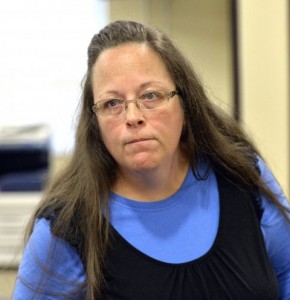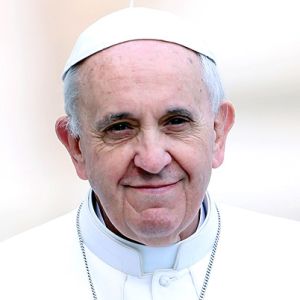As expected, the Obama Administration today asked the Supreme Court not to exempt Catholic groups from an ObamaCare requirement to offer contraceptive coverage, after Justice Sonia Sotomayor gave them a temporary reprieve earlier this week.
That means that Catholic doctrine notwithstanding, President Obama and his minions want to enforce coverage which includes birth control pills and abortifacients for this person:
The Administration’s court filing comes in response to an emergency stay issued late Tuesday, December 31 by Justice Sonia Sotomayor which prevented the government from enforcing the Mandate against the Little Sisters of the Poor Home for the Aged.
The Becket Fund for Religious Liberty, which is representing the nuns in the case, argue that since the Catholic Church strongly opposes birth control, any requirement which requires that they pay for it or their insurance coverage include it is a violation of the Sisters’ religious liberties, as guaranteed by the First Amendment.
But the Justice Department, responding this morning before the 10 a.m. deadline imposed by Justice Sotomayor, reiterated its tired argument that the group has no foundation for its case. The Obama Administration contends that religious groups such as Little Sisters of the Poor can simply certify that they don’t want to provide contraception coverage, leaving it to a third-party provider (the insurance plan) to decide whether to provide coverage. The Administration’s response claims,
“Applicants have no legal basis to challenge the self certification requirement or to complain that it involves them in the process of providing contraceptive coverage.”
However, the Sisters have argued that even signing the certification form would violate their religious beliefs.
Mark Rienzi, senior counsel for the Becket Fund, said in a statement,
“The government demands that the Little Sisters of the Poor sign a permission slip for abortion drugs and contraceptives, or pay millions in fines. The Sisters believe that doing that violates their faith, and that they shouldn’t be forced to divert funds from the poor, elderly and dying people they’ve devoted their lives to serve.”
Until now, the Obama Administration has insisted that only churches are entitled to an exemption—and that the exemption does not extend to religious institutions such as social service agencies or schools. The United States Conference of Catholic Bishops, in their March 2012 statement, listed three areas of concern with the Affordable Care Act: (1) the narrow definition of “religious employers” that are exempted, (2) the “accommodation” of religious ministries excluded from that definition, and (3) the treatment of businesses run by people who seek to operate their companies according to religious principles.
The USCCB has refused to comply. In a fact sheet on the contraceptive mandate, the USCCB explained:
1. The mandate forces coverage of sterilization and abortion-inducing drugs and devices as well as contraception. Though commonly called the “contraceptive mandate,” the federal mandate also forces employers to sponsor and subsidize coverage of sterilization. And by including all drugs approved by the FDA for use as contraceptives, the mandate includes drugs that can induce abortion such as “Ella” (Ulipristal), a close cousin of the abortion pill RU-486.
2. The mandate does not exempt Catholic charities, schools, universities, or hospitals. These institutions are vital to the mission of the Church, but the Administration does not deem them “religious employers” deserving conscience protection because they do not “serve primarily persons who share the[ir] religious tenets.” The Administration denies these organizations religious freedom precisely because their religiously motivated purpose is to serve the common good of society—a purpose that government should encourage, not punish.
3. The mandate forces these institutions and others, against their conscience, to pay for and facilitate things they consider immoral. Under the mandate, the government forces religious insurers to write policies that violate their beliefs; forces religious employers and schools to subsidize and facilitate coverage that violates their beliefs; and forces conscientiously objecting employees and students to purchase coverage that violates their beliefs.
4. The federal mandate is much more sweeping than existing state mandates. Employers can generally avoid the contraceptive mandates in 28 states by self-insuring their prescription drug coverage, dropping that part of their coverage altogether, or opting for regulation under a federal law (ERISA) that pre-empts state law. The HHS mandate closes off all these avenues of relief. HHS’ policy of mandating surgical sterilization coverage is reflected in only one state law, Vermont. HHS also chose as its model the narrowest state-level religious exemption, drafted by the ACLU and existing in only 3 states (New York, California, Oregon).
5. Many others have joined the Catholic bishops in speaking out against the mandate. Many recognize this as an assault on the broader principle of religious liberty, whether or not they agree with the Church on the underlying moral question. For example, at a February 2012 congressional hearing on this issue, testimony supporting the USCCB’s position was heard from the President of the Lutheran Church-Missouri Synod, a distinguished Orthodox rabbi, and officials and professors from several Protestant institutions of higher learning. The nation’s two largest non-Catholic denomination, the Southern Baptist Convention, has strongly criticized the contraceptive mandate, as have leaders of the National Association of Evangelicals, Institutional Religious Freedom Alliance, Union of Orthodox Jewish Congregations of America, Evangelicals for Social Action, and the Council for Christian Colleges and Universities. An online declaration supporting the Church’s position has been signed by about 28,000 Catholic and non-Catholic women, including many health professionals, academics and businesswomen.
6. The rule that created the uproar has not changed at all, but was finalized as is. After its initial proposal of August 2011 was widely criticized across the political spectrum as an attack on religious freedom, the Administration announced its final rule of February 15, 2012 as a compromise. But in fact that rule finalizes the original proposal “without change.” So religious organizations dedicated to serving people of other faiths are still not exempt as “religious employers.”
7. The proposed “accommodation” is not a current rule, but a promise that comes due beyond the point of public accountability. On February 15, besides finalizing its mandate without change, HHS also announced it will develop more regulations to apply that mandate differently to “non-exempt, non-profit religious organizations”—the charities, schools, and hospitals that were left out of the “religious employer” exemption. The regulations for this “accommodation” will be developed during a one-year delay in enforcement, their impact not felt until after the November election.
8. In its March 21 Advance Notice, HHS makes it clear that even the “accommodation” will do nothing to help objecting insurers, objecting employers that are not “religious” as defined by HHS, or individuals. In its August 2011 comments, and many times since, the Catholic bishops’ conference identified all the stakeholders in the process whose religious freedom is threatened—all employers, insurers, and individuals, not only those who meet the government’s definition of religious employers. It is now clear that all insurers, including self insurers, must provide the coverage; and almost all individuals who pay premiums (whether enrolled in an individual plan or an employer plan) have no escape from subsidizing that coverage. Only organizations identified as “religious” (to be defined by later regulation) may qualify for the “accommodation.”
9. Even religious charities, schools, and hospitals that do qualify for the “accommodation” will still be forced to violate their beliefs. The mandate will still be applied with full force to all employees of these “second-class-citizen” religious institutions, and to the employees’ dependents such as teenage children. While the Administration says employees will not pay an additional charge for this coverage, ultimately the funds to pay for it must come from the premium dollars of the employer and employees. And when these organizations provide any health coverage to their employees, that will be the trigger for having the objectionable coverage provided “automatically” to all these employees and their dependents — even if both employer and employee object to it.
There’s more. You can access the full fact sheet and additional information regarding the HHS Mandate at the US Bishops’ website.
It seems, judging from today’s legal response, that the Justice Department has forgotten that it was President Obama himself who dug in his heels, insisting that all employees be provided this coverage. Today, the government dismisses the complaint by insisting that the nuns’ insurance is a “church plan” that is not required to provide contraceptive coverage. (Remember that what this means is the employee will still receive contraceptive coverage, which will be provided “free” by the insurance carrier.)
It is not known when Justice Sotomayor will make a decision in the case. She can rule herself or, more likely considering the case’s wide-ranging application, refer the question to the entire 9-member Supreme Court.
* * * * *
UPDATE: Kathryn Jean Lopez, over at The Corner, participated today in a conference call in with the Becket Fund. She reports on the Obama Administration’s “Shocking and Unnecessary ‘War’ on Nuns Who Serve the Elderly Poor”, and she invites her readers to consider making a financial gift to the Little Sisters of the Poor. Read her excellent insights here.












